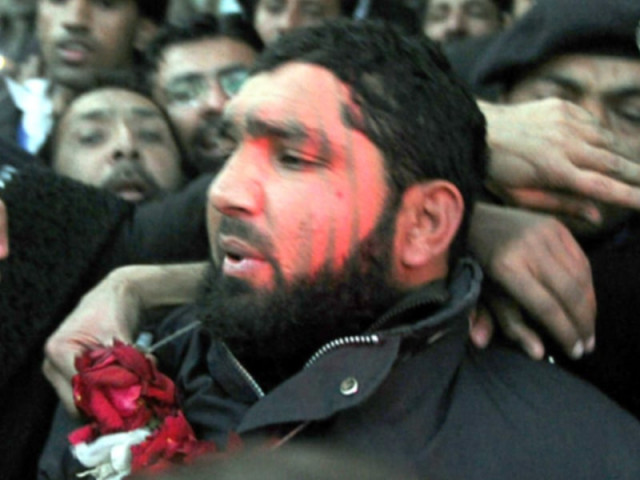Supreme Court to hear Mumtaz Qadri’s appeal on April 20
Qadri's counsel says once somebody commits blasphemy, he must face consequences irrespective of intent

Mumtaz Qadri PHOTO: AFP
The two judge bench of the apex court, comprising of Justice Dost Muhammad Khan and Justice Umar Ata Bandial, will take up Qadri’s appeal on April 20.
On March 9, the IHC had dismissed Qadri’s appeal against his two capital punishments awarded by an anti-terrorism court (ATC) in October 2011.
In an eight-page part of the ruling, the court said that intentions are an important factor before labeling someone a blasphemer.
Read: Mumtaz Qadri appeals against death sentence in Supreme Court
Justice (retd) Mian Nazeer Akhtar, counsel for the applicant, stated while talking to the media that the part about intent was illegal and also un-Islamic because Section 295-C of the Pakistan Penal Code (PPC) did not define element of intent.
In Akhtar’s words, the IHC’s 'un-Islamic' judgment had various illegalities. “Once somebody commits blasphemy, he must face the consequences,” he said, adding that by terming the blasphemy law as a “black law”, Taseer had committed blasphemy and deserved death.
In the petition, the plaintiff has submitted that the case does not fall under Section 302 (murder with intention) of the Pakistan Penal Code (PPC), which recommends death penalty, but under Section 302(b), which carries punishment of life imprisonment.
Justice (retd) Khawaja Muhammad Sharif, a former chief justice of Lahore High Court (LHC), is also defending Qadri voluntarily.
Read: Mumtaz Qadri does not deserve mercy, Taseer's family appeals to court
Meanwhile, the federal government has challenged the IHC’s verdict. A senior official of the federal government has revealed to The Express Tribune that the interior ministry has moved an appeal against the IHC’s March 9 judgment, wherein charges of terrorism against Qadri have been omitted.
The IHC set aside his conviction under section 7 of the ATA but upheld the death sentence under 302 of the PPC, meaning that Qadri is guilty of murder but not terrorism. The federal government has strong reservation over the high court’s findings to set aside the terrorism charges against Qadri, said the official, adding that terrorism is itself defined in the Anti-terrorism Act 1997.
The IHC has found that none of the prosecution witnesses, barring one, and neither the investigating officer nor the prosecution evidence suggest that Qadri’s act amounted to an attempt to create panic, to intimidate and terrorize the public, or to create a sense of fear and insecurity among the public.
Read: Taseer murder case: IHC upholds Mumtaz Qadri's death sentence
However, the interior ministry, on April 8 moved an application in the apex court, requesting to give seven days’ time to file a proper appeal along with paper books in this case. Under the SC’s rule, the appeal should be filed within 30 days. The SC is yet to fix the federal government’s appeal against the IHC judgment on April 20.
Earlier, the federal government faced embarrassment when on Wednesday, an Advocate on Record, namely Safdar Hussain Shah, refused to file the interior ministry’s application in this matter because he was not in favour of the death penalty being awarded to Qadri. The federal government later engaged another AOR, Sadiq Baloch, to file the application.



















COMMENTS
Comments are moderated and generally will be posted if they are on-topic and not abusive.
For more information, please see our Comments FAQ